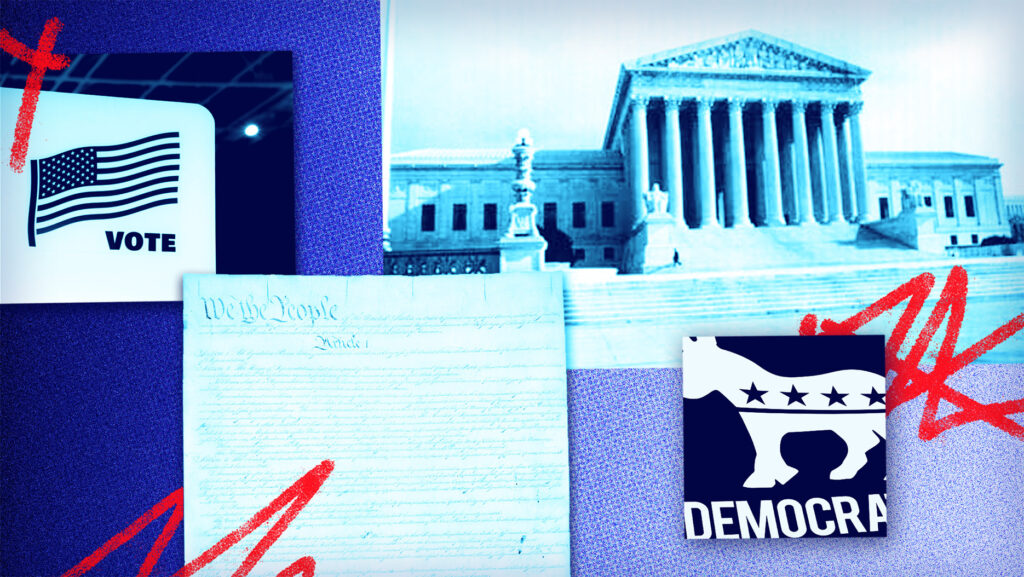30 Years, One Fight

My first introduction to the U.S. Supreme Court was in 1996. I was 26 years old, a third-year associate, and I was asked to help draft an amicus brief for the Democratic Party. The Republican Party had brought a case to challenge the limits on how much political parties can spend in direct coordination with their candidates. Safe to say, it was an intimidating task.
Coordinating comments from various clients and lawyers was overwhelming as a junior associate. And to make matters worse, the East Coast had been hit with a major blizzard that dropped more than a foot of snow, paralyzing Washington, D.C.
It was a different time. There was no such thing as remote work, and legal research was still largely done by going to the law library and finding cases in physical books. Briefs were either dictated or written in longhand and then typed. Even worse, Supreme Court briefs had to be typeset by a commercial printer. Editing meant resetting all the letters on at least that page.
Republicans failed to achieve their goal in that case — and in several other efforts over the years — to strike down the coordinated party spending limits. But they never stopped trying.
Now, nearly 30 years later, the Supreme Court has announced it will once again consider a Republican challenge to these same limits. And times have changed.
The logistics of drafting and filing Supreme Court briefs have improved dramatically. And as the chair of a law firm specializing in representing Democrats and pro-democracy causes, I have a lot more help.
My clients are still the national Democratic Party, but we are no longer just amici. Instead — after the Department of Justice sided with the GOP — we will have the primary job of defending the law before the high court.
Also, and perhaps most notably, the Supreme Court has changed. In 2001, the Court ruled 5–4 to uphold the party spending limits against the Republican Party’s challenge. That Court was conservative — but less so than today. Only Justice Thomas remains on the bench, and he sided with the Republican Party.
Already, many of the usual pundits and prognosticators are predicting that the Supreme Court will rule in favor of the GOP. They have not yet seen the briefs or heard the arguments but are convinced these are mere details on the road toward an inevitable Republican victory.
These doomsayers have bet against those of us fighting for democracy before — and lost.
Two years ago, the same experts were certain we would lose Moore v. Harper — the Independent State Legislature case that would have stripped state courts of the ability to apply their own constitutions to federal voting laws. We won, 6–3.
They also confidently predicted our defeat in Allen v. Milligan — the Alabama redistricting case we won in June 2023. The result was the creation of two majority-Black congressional districts in Alabama for the first time since the enactment of the Voting Rights Act in 1965.
I’m not here to convince you that we will win this case or that the Supreme Court — especially in its current form — isn’t a difficult venue for campaign finance or voting rights cases. I know better than most how hard these cases are to fight — and to win.
All I ask is that you reject the cool cynicism and fashionable fatalism that come with expecting Democrats — and democracy itself — to always lose before the current Supreme Court. Not only is it untrue, but it’s also hurting democracy.
We are not powerless and we must not act like we are.
Ironically, it is the Republican Party and Donald Trump who benefit from the idea that the judicial system is rigged and that Democrats can never get a fair hearing. With Republicans in control of Congress and the presidency, they want us to believe we are powerless to stop their lawlessness and Trump’s march toward authoritarianism.
We are not powerless and we must not act like we are. By expecting — insisting — that courts protect the Constitution and the rule of law, we use one of the most important tools available to us.
So, the next time a pundit or so-called expert tries to convince you that we cannot win before the Supreme Court, tune them out. Instead, use your own voice to insist that everyone, including the courts, do what is necessary to protect the rule of law and the Constitution.
This is not ignoring reality or engaging in wishful thinking. To the contrary, it is helping create a reality where the expectation is that courts will take the cases and threats before them seriously.
Later this summer, the Republicans will file their opening brief. I will then have the chance to work with an amazing group of lawyers and clients to draft and submit our own. The technology may have changed the way we research and draft briefs. Printing no longer requires laborious typesetting. Most critically, it won’t be snowing.
But my commitment to fighting for my clients — and for democracy — will remain the same. That is something that will never change.